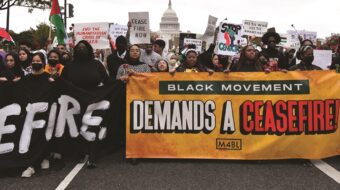Somalia: Fighting, danger to civilians mount
Shelling and raids intensified in Mogadishu on December 25 between African Union troops backing the U.S. supported Somali government and Islamic Al Shabaab combatants. Observers attribute worsening conflict to the merger a week earlier between former rival groups Hizbul Islam and Al Shabaab, each associated with Al Qaeda. As reported by longwarjournal.org, a Shabaab spokesperson sees conditions ripening for “a wider jihad in East Africa” and creation of a “greater Somalia.” The ongoing humanitarian crisis is manifested by Somali people continuing to risk the dangerous Gulf of Aden crossing to Yemen. Two boatloads of migrants, including women and children, arrived on December 26. Some 54,000 Somalis entered Yemen in 2009, with most ending up in UN sponsored refugee camps.
South Korea: Villagers protest U.S. naval base
“The waters to the south of Jeju Island are pivotal to our security,” opined the mainstream JoongAng Daily as it cited container ship traffic and border disputes with China and Japan. A court decision December 15 rejected claims from local residents who for three years have contested a proposed base for South Korean and U.S. naval vessels at Gangjeong Village, situated on the island’s southern tip. On Christmas, Catholic Bishop Kang Woo-Il led a peace mass. Quoted on space4peace.blogspot.com, he vowed to be “together with the lonely and oppressed Gangjeong villagers.” A “military base cannot save peace and life,” he declared. On December 27 hundreds of protesters tried to block arriving construction machinery.
Cuba: Building oil partnership with Russian firms
The Russian Lukoil oil corporation announced plans recently to construct refineries in Cuba and investigate off-shore oil exploration possibilities in the Gulf of Mexico. Russia’s Nafta-Sintez company is preparing to manufacture Cuban oil derivatives, while Russian companies will be building platforms for extracting undersea oil. In June, the Russian state-owned JSC Zarubezhneft Company agreed to undertake recuperation of old oil extraction sites. And other agreements it signed represented the first bilateral energy-related accords in 25 years. According to Pueblo en Línea news, current negotiations with Russian oil companies could result in Russia becoming Cuba’s prime oil production partner. However, foreign operated oil extraction facilities containing more than 10 percent U.S. components violate U.S. blockade regulations.
Colombia: New human rights failures
The government of President and former Defense Minister Juan Manuel Santos faces new criticism. On December 16, activists accompanied judicial investigators to one of several common graves in Meta expected to yield 1,500 corpses. TeleSur suggests they represent “more civilian murders perpetrated by the Army.” The Western Hemisphere’s largest common grave – 2,000 bodies – was discovered a year ago in nearby Macarena. In both instances, civilians were killed and dressed as guerrilla casualties as tokens of army successes. And a bleak report from Oxfam and other groups surfaced in mid December. From 2001 through 2009, soldiers and paramilitaries occupying 409 municipalities were shown to have committed “direct sexual violence” against 489.687 women, amounting to 17.6 percent of the adult female population. U.S. military and police aid to Colombia came to $415 million in 2010, according to justf.org. In 2009, Washington provided arms and military equipment worth $114 million.
Israel: Prospect of short track to Palestinian sovereignty riles government
Brazil, Ecuador, Uruguay, Argentina and Bolivia recently announced unilateral diplomatic recognition of a Palestine state defined by borders existing before the 1967 Israeli invasion. With 11 European nations upgrading diplomatic ties with Palestine, an alternative has appeared to a two-state solution reached through negotiations. To ward off a likely foreign policy crisis, Labor Party Cabinet minister Benjamin Ben-Eliezer on December 19 called for a return to negotiations broken off when Israel resumed construction of settlements in the occupied West Bank in September. The Uruguayan Foreign Minister, quoted on rebelion.org, sees “equivalence of power” as necessary for successful negotiation. The U.S. House of Representatives on December 15 unanimously called for U.S. non-recognition of a Palestinian state if constituted unilaterally.
Russia: Threats mount against minorities
Some 1,500 Muscovites rallied on December 26 with signs such as “Russia is for everyone” and “Russia without Fascism.” Speaking to reporters, politician Vladimir Ryzhk warned that, “Any outbreak of nationalism in Russia will ruin the country.” They were reacting to fallout from the killing of Yegor Sviridov at a football match on December 6 when Russian and minority group spectators clashed. A week later, 5000 ultra-nationalistic Russian football fans demonstrating in Red Square caused dozens of injuries. Aljazeera reports widespread concern that governmental inaction signifies underlying disinclination to deal with a “rising tide of xenophobia.” All but one of the December 6 murder suspects were released on bail.

MOST POPULAR TODAY

High Court essentially bans demonstrations, freedom of assembly in Deep South

Zionist organizations leading campaign to stop ceasefire resolutions in D.C. area

U.S. imperialism’s ‘ironclad’ support for Israel increases fascist danger at home


UN warns that Israel is still blocking humanitarian aid to Gaza






Comments